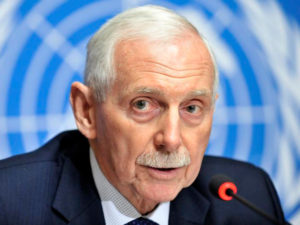UN commits to stamp out sexual abuse
 Two of the United Nations’ top officials have responded to claims that aid workers have been sexually exploiting the very people they are supposed to be assisting.
Two of the United Nations’ top officials have responded to claims that aid workers have been sexually exploiting the very people they are supposed to be assisting.
In an article written under the aegis of the World Economic Forum Director General of the International Organisation for Migration (IOM) William Lacey Swing and UN Undersecretary-General for Humanitarian Affairs and Emergency Relief Mark Lowcock say they are committed to the global fight to eliminate sexual exploitation, abuse and harassment in the humanitarian sector by taking decisive action in our policy-making, advocacy and operations.
“Sexual exploitation and abuse by humanitarian and development workers against the very people they are meant to be helping is the gravest violation of this trust. It completely contradicts our organizations’ core principles and responsibilities,’” the pair say.
The article continues:
“Around the world, brave women have broken their silence on the sexual harassment and abuse suffered at the hands of those with power. Their courage is paving the way for others to speak out about their own experiences.
This is the case when a survivor of sexual exploitation comes forward to make a claim against a UN staff member, who was meant to be helping them or was even their fellow colleague. But it is not the survivors’ responsibility to stop harm from being carried out. It is up to all UN staff members and leaders to eradicate the sense of impunity that has existed in the international community for far too long.
We need to ensure that survivors receive the support and justice to which they are entitled.
As members of the UN system, the United Nations Office for the Coordination of Humanitarian Affairs (OCHA) and the International Organization for Migration (IOM) have a zero-tolerance policy on sexual exploitation and abuse by our personnel of those we are assisting; and on sexual harassment and abuse of colleagues. Although very much linked, these are distinct issues.
We are firmly committed to the global fight to eliminate sexual exploitation, abuse and harassment in the humanitarian sector by taking decisive action in our policy-making, advocacy and operations.
The relationship between our field staff and the vulnerable people they assist is built on trust. Sexual exploitation and abuse by humanitarian and development workers against the very people they are meant to be helping is the gravest violation of this trust. It completely contradicts our organizations’ core principles and responsibilities.
To protect those we assist from sexual exploitation and abuse, we have each established standard operating procedures for submitting and receiving complaints; reporting, investigation and disciplinary proceedings; and victim assistance programmes. We have also committed to regular mandatory training and making information available to all staff members on the prevention response to exploitation and abuse.
At OCHA and IOM, we have also reformed our human resources structures to ensure that aid beneficiaries are better protected. Focal points for protection from sexual exploitation and abuse (PSEA) have been established at headquarter, regional and country levels of UN offices. In field programmes, humanitarian coordinators are charged with ensuring that effective prevention and response systems are in place and that progress reports are made annually to the Emergency Relief Coordinator. Heads of UN agencies and major NGOs must propel this progress as per an agreement made through the Inter-Agency Standing Committee (IASC), a key humanitarian coordination platform, chaired by OCHA. The Director-General of the IOM propels progress across the IASC, as its champion on this issue.
We still have a long way to go before we can say that sexual exploitation and abuse, and the lack of accountability that surrounds it, is a thing of the past. Progress is slowed because incidents often go unreported or under-reported. We are working hard to ensure that survivors know how to report and will benefit from justice once they do. This is a fundamental step if we are to make a real difference.
But the UN’s zero tolerance policy cannot stop there. We must also protect our own staff from harm.
Sexual harassment violates a person’s rights and breaches the principles of the UN Charter. For female and LGBTQI colleagues, sexual exploitation causes emotional and physical harm and challenges their inclusion and participation at every level. To protect staff from sexual harassment, greater diversity is paramount. Having more women in all areas of work and at all levels would clearly help put an end to this harm and this is something we are working on. But this is not to say that men are not also victims of sexual harassment and abuse in the workplace.
In line with the Secretary-General’s UN-wide policy on sexual harassment in the workplace, we impose zero tolerance on sexual harassment in each of our organizations. Complaints mechanisms have been established with follow-up procedures through the head of the organization. We have made headway, but our efforts must now be matched with proactive policies to protect personnel and empower survivors.
Sexual exploitation and abuse of people in need, as well as sexual harassment and abuse in the office, have no place in the UN or anywhere else. As international leaders, we will continue to work every day to eliminate it for good.”
Laurie Nowell
AMES Australia Senior Journalist












